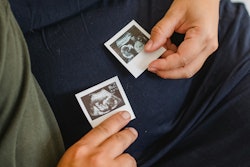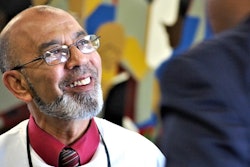Black Scientists on Prestigious Genome Project Voice Concerns
Each step forward in the quest to unlock the mysteries of human life and its diseases takes genetics researchers deeper into an ethical, legal and financial minefield.
Consider the following hypothetical multiple choice item:
Advances in genetic research:
(a) reveal life’s biochemical infrastructure and gain precious ground for scientists in the search for cures for diseases that can be linked to hereditary traits;
(b) provide lawmakers with new justification for mandating desirable behavior, law enforcers with tools to predict who’ll commit crime and lawbreakers with more excuses;
(c) allow insurance companies to reduce their liabilities;
(d) fuel the fears of groups that believe there are forces conspiring to eliminate them; or
(e) all of the above.
The answer is (e) according to African-American genetic scientists, who say that those statements are a mere sampling of the philosophical barriers that are piling up as fast as breakthroughs in genetic research.
“In many ways (gene research) is an example of how scientific advances are outpacing our ability to deal with them,” says Dr. James B. Bowman, pathology professor emeritus at the University of Chicago, where he teaches a course in evolution and human diversity.
Bowman, co-author of “Genetic Variation in Peoples of African Origin,” was talking about opposition to genetic research. In that arena, scientists are exploring the properties and characteristics of genes — short segments of the deoxyribonucleic acid (DNA) — that contain the biological instructions for cell behavior.
Bowman and other Black scientists say they spend much of their non-laboratory time either fighting off attempts to use information about genetics to make sweeping judgements about racial characteristics or breaking down resistance to what they do as expressed by some outside the world of medical research.
At the heart of the concerns are memories of how dubious theories about race were used to justify assertions about the genetic inferiority of non-white peoples at the turn of the century.
Now, scientists are eager to make sure that the limits of gene research are well known.
“Even if the geneticist could tell us something about the biology of competitiveness or aggression or impulsivity, there is no amount of genetics that is ever going to tell you whether that competitiveness or aggressiveness or impulsivity is going to be expressed in a barroom or in a boardroom,” says Erik Patens, an associate for philosophical studies at the Hastings Center. “One we praise and another we don’t. We still can’t tell who’s going to be a CEO and who’s going to be a crackhead.”
Broadly stated, genetic research is at the cutting edge of medical research.
“We are literally handling the basis of biological life,” says Dr. Georgia Dunston, a member of the National Institutes of Health’s Human Genome Project.
Dunston is part of the African-American contingent of the hundreds of scientists enlisted in one of man’s most ambitious global scientific efforts outside the manned space program. In the Genome Project, scientists in 50 countries, including both industrialized and Third World nations, are trying to analyze the nature and characteristics of 100,000 or so human genes, the building blocks of the human chromosome.
Ambitious Global Project
The genes, drawn from human tissue samples, are being analyzed in laboratories around the world.
The product will be a detailed map of the DNA that, in a computerized database of an estimated 3 billion bits of information, will describe humankind’s genetic pool. The goal is to be achieved by the year 2005, according to officials at NIH, which is spearheading the American part of the effort.
With the project nearing the half-way point, Dunston and other African-American genetic researchers find themselves in a professional dilemma.
They are battling skeptics outside the scientific arena who worry that the project will trigger a new wave of eugenics abuse that will revive discredited theories that linked Blacks with criminal behavior.
That fear was on display last fall at a University of Maryland conference on the prospects of identifying potential criminals by the content of their chromosomes.
With protesters outside chanting, “Maryland conference, you can’t hide, We know you’re pushing genocide,” one of the three days of the conference was disrupted t0y dissent so heated that at least one shoving match occurred.
Controversial Research
Research into this field is continually confronted with skepticism that knowledge about the makeup of the human gene could be used by racists.
“Every time there is a breakthrough, you move further from nurture and more toward nature,” says Jeremy Rifkin, one of the leading advocates for restrictions on genetic research.
The founder of the Foundation on Economic Trends, a Washington think tank. Rifkin argues that putting too much faith in science mortgages human advancement.
“The atmosphere is fraught with commercial possibilities.” says Rifkin. “Everyone wants the perfect baby.” he notes.
The result is that Black scientists find themselves squarely in the middle of one of the hottest science disputes of our time.
Many of them, in fact, are fighting to make sure that the project results in a useful representation of the genetic basis of humankind, despite being based on the genes of white people.
Dunston acknowledges that there are anti-minority advocates eager to use the genetic map of humankind to serve limited — and probably racist — purposes.
“We shouldn’t deny that people will misconstrue information to serve their agenda, but it would be a tragedy if we were not able to explore this area,” Dunston says.
Still, she says, the project is too important to be derailed by racial politics.
“Humankind is at a critical crossroads in our survival and of the evolution of the species,” she says.
`Misplaced’ Fears
Black scientists find themselves battling to mute concerns of non-scientists who worry about the prospect of labeling people through genetic testing.
“The problem is that when people identify a genetic factor, there is a tendency by people who don’t understand to say there is nothing we can do about it and brand those with the trait `undesirable’,” says Robert F. Murray, medical genetics division director at Howard University’s School of Medicine.
Black scientists such as Murray and Bowman don’t share the skepticism of those outside the genetics research field.
“I don’t fear science. The [development of the] wheel, fire and aircraft have done a considerable amount of harm…far more than genetic research is likely to do,” Bowman says.
Anyway, he adds, “we are already in a eugenic society. “We can collect an ovum from a prospective mother and sperm from a prospective father, allow them to develop to the eight-cell stage, test one cell…and make a diagnosis for pre-symptom colon cancer or breast cancer,” says Bowman.
Still, he says, “I’m willing to take my chances with the bad parts. The fears are misplaced.”
Despite scientists’ efforts to lower expectations about the immediate benefits of the examination of the human gene pool, the drive is already on among non-scientists to create flawless humans — a situation that has made financial high-fliers out of drugs that did not exist 15 years ago.
An example is hGH, a synthesized human growth hormone that was developed through the manipulation of DNA in the laboratory.
Originally designed to treat dwarfism among an estimated 2,500 Americans who suffered from dramatically stunted growth, the drug became popular among parents who wanted to produce tall children, Rifkin says.
Less than a decade after it was introduced on the market, hGH ranked as the 34th largest-selling drug in the nation, according to congressional analysts.
As they come closer than man has ever been to critical answers about how the human organism works, researchers are willing to accommodate the impatience of the non-scientific world.
The problem, says Bowman, is that “we’ve the right doors but we don’t have the right keys yet.”
COPYRIGHT 1996 Cox, Matthews & Associates
COPYRIGHT 2004 Gale Group
© Copyright 2005 by DiverseEducation.com





















